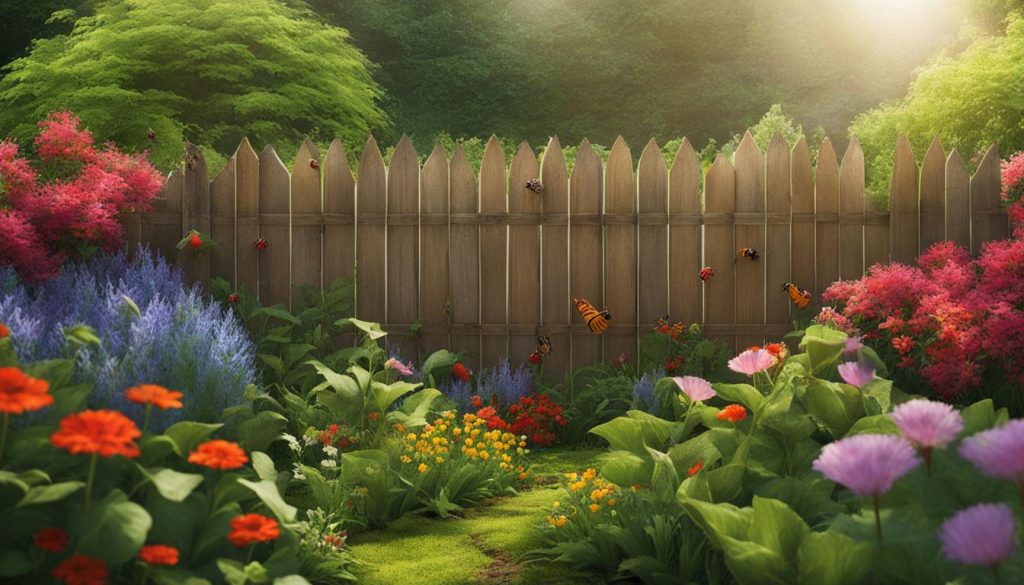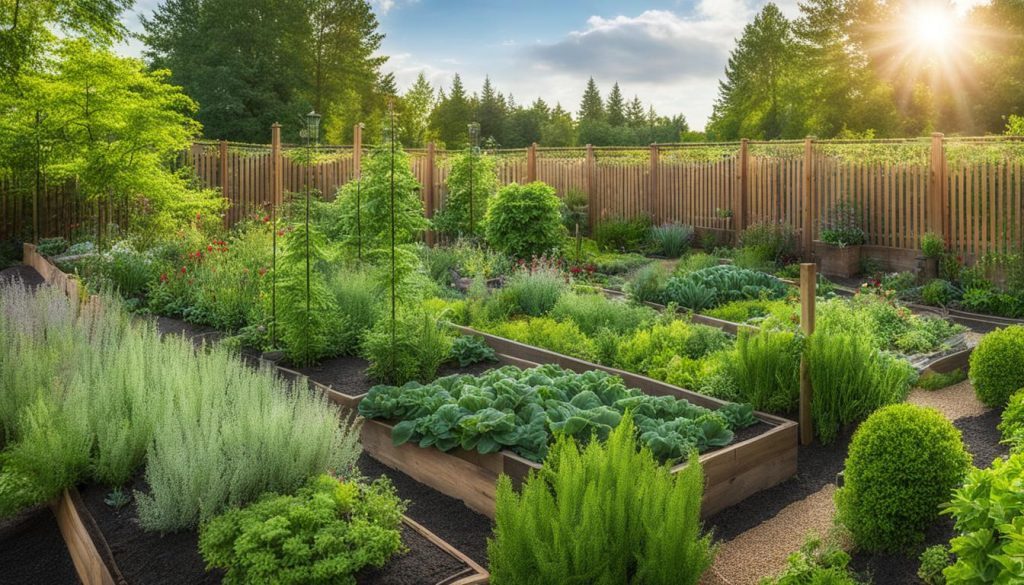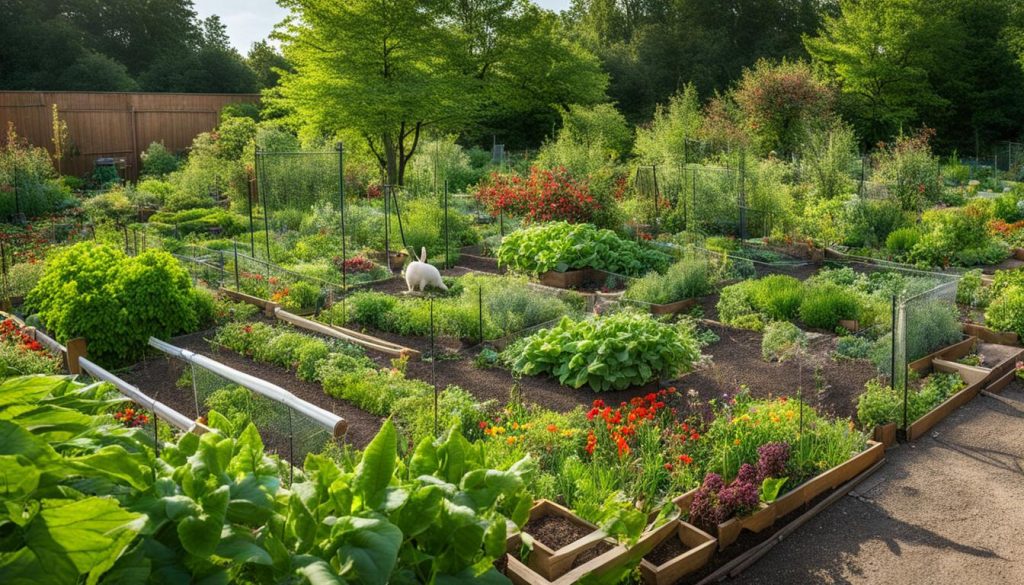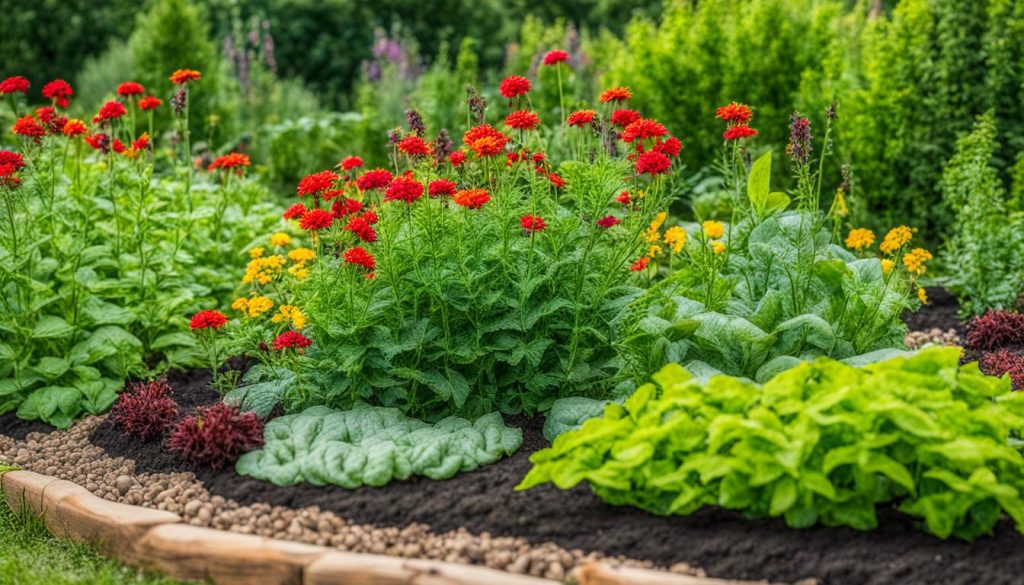
Humane Strategies to Protect Your Garden from Pests
Gardening is a wonderful way to connect with nature and cultivate beautiful plants. However, keeping pests at bay can be a challenge. In this article, I will share some organic pest control methods and pest-resistant plants to help you protect your beloved garden.
When it comes to protecting your garden from pests, there are several humane strategies you can employ. One effective option is to invest in an ultrasonic pest repellent, which emits high-frequency sounds and strobe lights triggered by animal movement. Another approach is to build a fence around your garden to create a barrier against unwanted visitors. If only a few plants are being targeted, consider placing a wire cloche over them as a protective measure.
Installing a raised garden bed is another worthwhile investment as it prevents smaller pests from reaching your plants. For pests like moles and gophers, try using castor oil, as they dislike its taste. Cayenne pepper, with its universal scent and taste, can also deter pests from invading your garden.
If these methods fail, noise can be a simple yet effective solution. You can also set up a bird or squirrel feeder that attracts pests away from your garden.
In the next sections, we will explore natural pest repellents, garden design techniques, and humane strategies for dealing with specific pests. Stay tuned to discover eco-friendly ways to protect your garden and promote a harmonious environment for both your plants and the wildlife that surrounds them.
Utilizing Natural Pest Repellents
When it comes to managing garden pests, utilizing natural pest repellents can be an effective and eco-friendly approach. By incorporating these methods into your pest control strategies, you can ensure the health and vitality of your garden without resorting to harmful chemicals.
Mint is a versatile plant that pests despise. You can take advantage of this by planting a border of mint around your garden or areas prone to high pest activity. Alternatively, you can use peppermint essential oil and spray it on hard surfaces around your garden to create a minty barrier. Another option is to scatter mint tea bags throughout the garden, releasing the scent and taste that pests find repulsive.
In addition to mint, bar soap can also serve as a natural pest repellent. Irish Spring bar soap, or any other bar soap, can be grated and sprinkled around your garden to deter pests. The strong scent of the soap is known to repel a variety of unwanted visitors.
“Mint is a versatile plant that pests despise.”
For those dealing with persistent pests such as moles and gophers, castor oil can be an effective deterrent. These rodents find the taste of castor oil unpleasant, making it an ideal natural repellent. Simply apply castor oil to the areas where these pests are active, and they will be less likely to invade your garden.
A sprinkle of cayenne pepper can also work wonders in keeping pests away from your crops or targeted plants. The strong scent and taste of cayenne pepper is a natural deterrent for many garden pests. Consider sprinkling it over the areas where pests continue to cause damage.
Utilizing Natural Pest Repellents
| Pest Repellent | Method |
|---|---|
| Mint | Plant a border of mint around your garden, spray peppermint essential oil, or scatter mint tea bags |
| Bar Soap | Grate and sprinkle bar soap around your garden |
| Castor Oil | Apply castor oil to deter moles and gophers |
| Cayenne Pepper | Sprinkle cayenne pepper over targeted areas |
Another natural approach to pest control is noise. Adding wind chimes or a radio to your garden can create sound vibrations that pests find unsettling. This can help scare them away and create a less inviting environment for unwanted visitors.
By utilizing these natural pest repellents, you can effectively manage garden pests while maintaining an eco-friendly approach. Say goodbye to harmful chemicals and embrace these natural solutions to protect your garden and promote a healthy ecosystem.
Preventing Pest Invasion with Garden Design
Garden design plays a crucial role in preventing pest invasion. By implementing strategic measures, you can create a garden that is less attractive to pests and more resilient to their attacks. Here are some effective methods to consider:
1. Building Raised Garden Beds
Constructing raised garden beds not only adds aesthetic appeal to your garden but also helps prevent pests from reaching your plants. By elevating the planting area, you create a physical barrier that deters smaller pests like slugs and snails. Additionally, raised beds provide better drainage, reducing the risk of water accumulation that can attract pests.
2. Planting Pest-Resistant Plants
Choosing the right plants for your garden can make a significant difference in pest prevention. Opt for pest-resistant varieties that naturally repel insects and critters. Marigolds, chives, and mint are excellent choices, as their strong scents deter pests. Including these plants throughout your garden acts as a natural deterrent, reducing the likelihood of pest invasion.
3. Proper Garden Design and Layout
A well-designed garden layout can discourage pests from taking up residence. For instance, spacing your plants adequately allows for proper airflow and reduces the risk of disease and infestation. Creating clear pathways and maintaining proper plant support also helps with pest control by minimizing hiding spots and making it easier to identify and address pest issues.
By implementing these garden design strategies, you can significantly reduce the risk of pest invasion and create a harmonious environment for your plants to thrive.

| Pest-Resistant Plants | Pest-Repelling Qualities |
|---|---|
| Marigolds | Strong scent repels a wide range of pests, including aphids and nematodes. |
| Chives | Repels aphids, Japanese beetles, and carrot flies. |
| Mint | Deters ants, aphids, cabbage moths, and rodents. |
Humane Strategies for Dealing with Specific Pests
When it comes to garden pest control, it’s important to choose humane and eco-friendly methods. Here are some strategies for dealing with specific pests:
Ants
To repel ants, you can use substances like vinegar, chalk, essential oils, and natural repellents. These options are effective in deterring ants without causing harm to them or the environment.
Cats
If you want to keep cats out of your garden, there are a few humane techniques you can try. First, remove any sources of food and shelter that may attract cats. You can also utilize ultrasound devices that emit sounds only cats can hear, deterring them from entering your garden.
Grasshoppers
Garlic oil and specific herbs can be used to deter grasshoppers from your garden. These natural repellents create an environment that grasshoppers dislike, encouraging them to stay away from your plants.
Mice
Peppermint plants are an effective way to keep mice away from your garden. The strong scent of peppermint acts as a natural deterrent, ensuring that mice stay out of your plants and harvest.
Rabbits
If rabbits are causing damage to your garden, you can try using chili pepper or planting certain plants that rabbits dislike. These methods create an unpleasant environment for rabbits, encouraging them to find food elsewhere.
Slugs and Snails
Mint, lemon balm, and human hair are all effective in repelling slugs and snails. These natural repellents create a barrier that these pests do not like to cross, protecting your plants from damage.
Ticks and Fleas
If ticks and fleas are a concern in your garden, you can use cedar wood chips or specific plants like mint or rosemary. These natural repellents discourage ticks and fleas from settling in your garden, keeping both your plants and pets safe.
Humane Pest Control Techniques
| Pest | Humane Control Techniques |
|---|---|
| Ants | Use vinegar, chalk, essential oils, or natural repellents. |
| Cats | Remove sources of food and shelter, and use ultrasound devices. |
| Grasshoppers | Utilize garlic oil or plant specific herbs to deter grasshoppers. |
| Mice | Plant peppermint to keep mice away from the garden. |
| Rabbits | Use chili pepper or plant rabbit-resistant plants. |
| Slugs and Snails | Repel with mint, lemon balm, or human hair. |
| Ticks and Fleas | Use cedar wood chips or plant mint or rosemary. |

Humane Strategies for Dealing with Common Pests
When it comes to garden pest prevention, it’s important to prioritize eco-friendly pest control methods. By utilizing humane strategies, we can protect our plants without causing harm to the animals and insects that share our garden space. Here are some effective techniques for dealing with common pests in a humane and environmentally conscious way.
Ants
To repel ants, consider using substances such as vinegar, chalk, essential oils, or natural repellents. These options are not only safe for the environment but also effective in deterring ants from invading your garden. For instance, creating a barrier with vinegar or drawing a line with chalk can help keep ants at bay. Additionally, natural ant repellents made with ingredients like peppermint or citrus oils can provide an eco-friendly solution to ant problems.
Cats
If you’re dealing with cats in your garden, it’s important to deter them without causing harm. Removing sources of food and shelter, such as uncovered garbage or dense vegetation, can make your garden less attractive to cats. You can also try using ultrasound devices that emit high-frequency sounds, which are unpleasant to cats but harmless to humans and other animals. By implementing these humane strategies, you can create a garden space that is less appealing to cats without resorting to harmful methods.
Grasshoppers
When it comes to grasshoppers, there are natural repellents that can help protect your garden. Garlic oil can be an effective deterrent, as grasshoppers dislike the smell. Another option is to plant specific herbs that grasshoppers tend to avoid, such as cilantro or basil. By incorporating these plants into your garden, you can help minimize the damage caused by grasshopper infestations.
Mice
Dealing with mice in a humane way involves keeping them away from your garden without causing harm. One effective method is to plant peppermint plants, as mice dislike the strong scent of mint. By strategically placing peppermint plants around your garden, you can create a natural barrier that deters mice from entering. This eco-friendly approach ensures the safety of both your plants and the mice.
| Pest | Humane Strategy |
|---|---|
| Ants | Repel with vinegar, chalk, essential oils, or natural repellents |
| Cats | Deter with removal of food and shelter, and use ultrasound devices |
| Grasshoppers | Repel with garlic oil or by planting specific herbs |
| Mice | Keep away with peppermint plants |
Additional Humane Pest Control Methods
In addition to the mentioned methods, there are other humane pest control strategies that can help you protect your garden without harming the animals and insects that call it home. One effective approach is to attract beneficial insects that prey on garden pests. By planting certain flowers and herbs, such as lavender, dill, and yarrow, you can create a diverse ecosystem that helps maintain a balance and reduce pest problems.
Garden hygiene also plays a crucial role in pest control. Regularly cleaning your garden and removing debris can help prevent pest infestations. Pests, such as slugs and snails, often hide in damp and cluttered areas, so keeping your garden tidy can discourage their presence. Additionally, removing any fallen fruits or vegetables can prevent attracting pests like rodents and insects.
Another effective method is companion planting, which involves growing certain plants together to deter pests. For example, planting marigolds alongside your vegetables can repel pests like aphids, nematodes, and whiteflies. Similarly, planting onions, garlic, or chives can deter pests like carrot flies and aphids. Researching companion planting techniques can help you identify suitable plant combinations to naturally repel specific pests.
| Pest | Control Method |
|---|---|
| Slugs and Snails | Plant mint or lemon balm around vulnerable plants, or sprinkle diatomaceous earth |
| Aphids | Attract ladybugs by planting dill, fennel, or cilantro |
| Cabbage Worms | Plant thyme, sage, or rosemary alongside your cabbage family plants |
Remember, implementing organic pest control methods may take time and experimentation to find what works best for your garden. It’s important to regularly monitor your plants for signs of pest damage and adjust your strategies accordingly. With patience and persistence, you can create a thriving garden while maintaining a humane and eco-friendly approach to pest control.

Creating a Wildlife-Friendly Garden
When it comes to gardening, there are steps you can take to not only protect your plants but also create a habitat that supports native wildlife. By implementing wildlife-friendly practices, you can promote biodiversity and contribute to the health of your local ecosystem. Here are some tips on how to create a wildlife-friendly garden:
- Plant native species: Choose plants that are native to your region as they provide food and shelter for local wildlife. These plants have adapted to the local climate and soil conditions, making them more resilient and attractive to native species.
- Create habitats: Install birdhouses, bee hotels, and bat boxes to provide additional shelter for wildlife. These structures offer safe nesting sites and can attract beneficial insects and pollinators to your garden.
- Provide water sources: Set up a birdbath, a small pond, or even a shallow dish with fresh water. These water sources will not only attract birds but also provide hydration for other wildlife, such as frogs or insects.
“Creating a wildlife-friendly garden promotes biodiversity and contributes to the health of the local ecosystem.”
By creating a pesticide-free environment, you can ensure that your garden is safe for wildlife. Avoid using chemical pesticides and opt for organic pest control methods instead. This will protect beneficial insects, birds, and other animals that play a crucial role in maintaining a balanced ecosystem.
Furthermore, consider incorporating diverse plantings and providing different heights and textures in your garden. This will attract a wider range of wildlife, from butterflies and bees to small mammals and birds. Create a garden that offers food, shelter, and nesting opportunities throughout the year.
Attracting Specific Wildlife
If you have a particular interest in attracting certain wildlife species, you can tailor your garden accordingly. Research the specific plants, flowers, or features that attract the wildlife you desire. For example, planting milkweed attracts monarch butterflies, while installing a hummingbird feeder can attract these beautiful, nectar-loving birds.
| Wildlife Species | Attracting Techniques |
|---|---|
| Butterflies | Plant nectar-rich flowers, such as coneflowers and butterfly bushes, and provide host plants for caterpillars. |
| Birds | Offer a variety of bird feeders with different types of seeds, as well as native plants that provide berries or seeds as food sources. |
| Bees | Plant a diverse range of flowering plants that bloom throughout the seasons and provide a source of nectar and pollen. |
Remember, creating a wildlife-friendly garden is an ongoing process that requires patience and observation. Take the time to learn about the wildlife in your area and their specific needs. By making small changes to your gardening practices, you can make a big difference in supporting native species and creating a thriving ecosystem right in your own backyard.
Conclusion
Protecting your garden from pests is essential for successful garden pest management. By implementing humane and eco-friendly methods, you can ensure the health and longevity of your plants while coexisting harmoniously with the animals and insects that call your garden home.
Utilizing natural pest repellents, such as mint and castor oil, can help deter pests from invading your garden. Building a raised garden bed and planting pest-resistant plants are effective strategies to prevent pest invasion. Additionally, creating a diverse ecosystem and maintaining good garden hygiene play a crucial role in reducing pest infestations.
By adopting these strategies, you can safeguard your garden from pests without resorting to harmful chemicals or causing harm to wildlife. Remember, protecting your garden is a balance between preserving your plants and respecting the natural ecosystem that thrives within it. Nurturing a wildlife-friendly garden not only benefits your plants but also supports native species and promotes biodiversity.